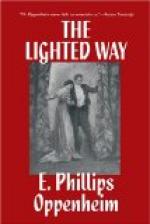“It is, then, because you have not considered the matter,” Sabatini declared. “You live in a very small corner of the world and you have accepted a moral code as ridiculously out of date as Calvinism in religion. The whole of life is a system of robbery. The strong help themselves, the weak go down. Did you call your splendid seamen of Queen Elizabeth’s time robbers, because they nailed the English flag to their mast and swept the seas for plunder? ‘We are strong,’ they cried to the country they robbed, ’and you are weak. Stand and deliver!’ I spare you a hundred instances. Take your commercial life of to-day. The capitalist stretches out his hand and swallows up the weaker man. He does it ten or fifty times a day and there is no one to stop him. It is the strong taking from the weak. You cannot walk from here to Charing Cross without seeing it. Some forms of plunder come under the law, some do not. Your idea as to which are right and which are wrong is simply the law’s idea. The man who is strong enough is the law.”
“Your doctrines are far-reaching,” Arnold said. “What about the man who sweeps the crossings, the beggars who ask for alms?”
“They sweep crossings and they beg for alms,” Sabatini replied, “because they are weak or foolish and because I am strong. You work for twenty-eight shillings a week because you are foolish. You can do it if you like, if it affords you any satisfaction to make a martyr of yourself for the sake of bolstering up a conventional system. Either that or you have not the spirit for adventure.”
“The spirit for adventure,” Arnold repeated quietly. “Well, there have been times when I thought I had that, but it certainly never occurred to me to go out and rob.”
“That,” Sabatini declared, “is because you are an Englishman and extraordinarily susceptible to conventions. Now I speak with many experiences behind me. I had ancestors who enriched themselves with fire and sword. I would much prefer to do the same thing. As a matter of fact, when the conditions admit of it, I do. I have fought in whatever war has raged since the days when I was eighteen. If another war should break out to-morrow, I should weigh the causes, choose the side I preferred, and fight for it. But when there is no war, I must yet live. I cannot drill troops all day, or sit in the cafes. I must use my courage and my brains in whatever way seems most beneficial to the cause which lies nearest to my heart.”
“I cannot imagine,” Arnold said frankly, “what that cause is.”
“Some day, and before long,” Sabatini replied, “you may know. At any rate, we have talked enough of this for the present. Think over what I have said. If at any time I should have an enterprise to propose to you, you will at least recognize my point of view.”
He touched the bell. A servant entered almost at once, carrying his overcoat and silk hat.
“I have taken a box at a music-hall,” he announced. “I believe that my sister may join us there. I hope it will amuse you?”




